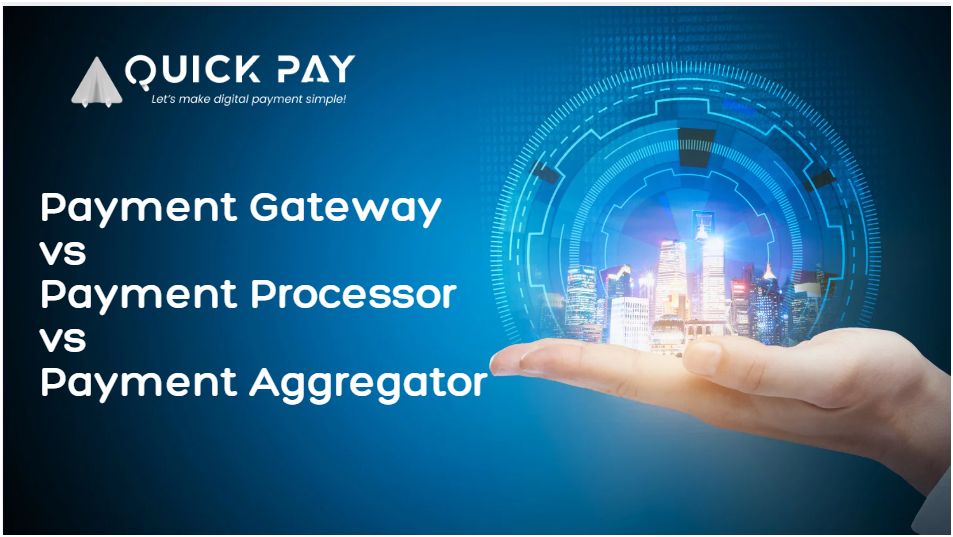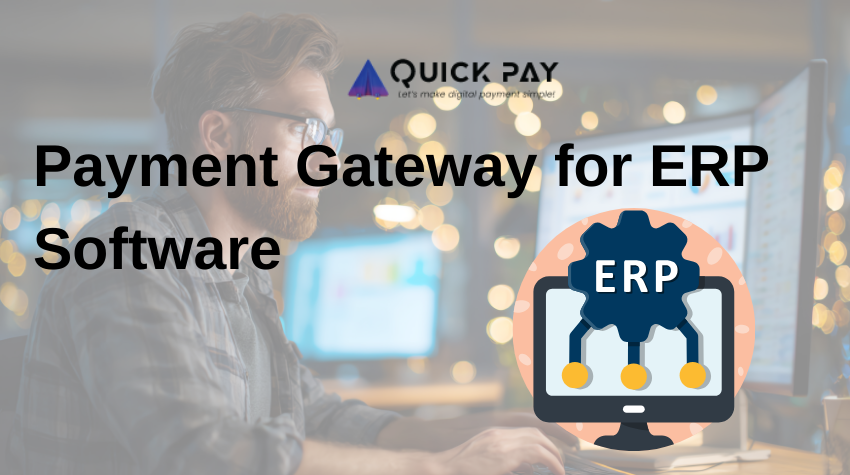Hey there, budding entrepreneur or seasoned business owner! Are you looking to supercharge your online sales and offer your customers a seamless payment experience? In today's fast-paced digital world, having a reliable and efficient payment system isn't just a luxury Ė it's a necessity. And that's where the best payment gateway in India, Quick Pay, comes into the picture!
Before we dive deep into the fantastic features of Quick Pay, let's clear up some common terms that often get tossed around in the world of online payments. Understanding these will give you a solid foundation to make an informed decision for your business.
What Exactly is a Payment Gateway?
Imagine a secure digital bridge between your customer, your business, and the banks involved in a transaction. That's precisely what a payment gateway is! It's a technology platform or digital service that enables businesses to securely accept and process payments from customers, whether online or in physical stores. It acts as an intermediary between the customer, the merchant, and their respective banks or payment processors, ensuring that payment information is securely transmitted and transactions are authorized efficiently.
Key functions of a payment gateway:
-
Encryption: Payment gateways encrypt sensitive payment data (like credit card numbers) to protect it during transmission.
-
Authorization: They forward transaction details to the merchantís acquiring bank, which then communicates with the customerís issuing bank to approve or decline the payment.
-
Fraud Prevention: Advanced security measures such as fraud detection algorithms, address verification, and CVV checks help prevent unauthorized transactions.
-
Integration: Payment gateways can be integrated with websites, mobile apps, or physical point-of-sale (POS) systems, allowing businesses to accept payments through various methods such as cards, digital wallets, UPI, and more.
-
Reporting: Many gateways provide transaction history and analytics to help businesses manage and track payments.
How it Works (Online Example):
-
The customer enters payment details at checkout on your website or app.
-
The payment gateway encrypts this information and securely sends it to the acquiring bank or payment processor.
-
The acquiring bank requests authorization from the customerís issuing bank.
-
The issuing bank approves or declines the transaction.
-
The payment gateway communicates the result back to the merchant and customer, completing the purchase if approved.
Payment Processor
While a payment gateway is the secure bridge, a payment processor is the powerful engine working behind the scenes. It's a third-party service or technology provider that manages and facilitates electronic payment transactions between customers and businesses. It acts as an intermediary, securely transmitting payment data between the customerís bank (issuing bank), the merchantís bank (acquiring bank), and often the card networks (like Visa, Mastercard, or RuPay).
Core functions of a payment processor:
-
Transaction Facilitation: When a customer initiates a payment (online or in-store), the payment processor receives the transaction details and securely transmits them to the relevant parties for authorization and settlement.
-
Authorization and Authentication: The processor requests approval from the customerís bank to ensure there are sufficient funds and verifies the validity of the payment method, helping to prevent fraud.
-
Encryption and Security: Sensitive payment information is encrypted and tokenized to protect it during transmission, and processors comply with strict security standards like PCI DSS.
-
Settlement and Funding: Once a transaction is authorized, the payment processor coordinates the actual transfer of funds from the customerís bank to the merchantís account, minus any applicable fees.
-
Fraud Detection and Chargeback Management: Advanced tools are used to detect suspicious activity, and processors assist businesses in handling disputed transactions (chargebacks).
-
Reporting and Analytics: Payment processors provide businesses with transaction data, reports, and analytics to help them track payments and manage finances.
How it Works (Simplified Steps):
-
Customer initiates a payment using a card, UPI, wallet, etc.
-
The merchantís system (or payment gateway) sends encrypted payment details to the payment processor.
-
The processor communicates with the card network and the customerís bank to authorize the transaction.
-
If approved, the payment processor ensures the funds are transferred from the customerís bank to the merchantís bank.
Payment Gateway vs. Payment Processor
Understanding the distinct roles helps in appreciating why both are vital for online payments.
The Role of a Payment Aggregator
A payment aggregator is a third-party service provider that enables businesses to accept multiple types of digital paymentsósuch as credit and debit cards, UPI, net banking, and mobile walletsówithout needing to set up individual agreements with each bank or payment provider. Payment aggregators act as intermediaries between merchants, customers, and financial institutions, consolidating various payment methods into a single, unified platform for businesses.
Key functions of a payment aggregator:
-
Merchant onboarding: Aggregators quickly onboard businesses, verifying their identity and compliance, so they can start accepting digital payments.
-
Payment processing: When a customer makes a payment, the aggregator securely collects and routes the payment details to the appropriate payment processor or bank for authorization and completion.
-
Fund settlement: After processing, the aggregator manages the settlement of funds, transferring the collected payments (minus fees) from its nodal account to the merchantís account, usually within a specified timeframe.
-
Additional services: Many aggregators offer value-added services like analytics, reporting, fraud detection, refunds, chargeback management, and customer support.
Analogy: Think of a payment aggregator as a single checkout counter in a mall that can accept payments on behalf of all the stores, saving each store from setting up its own counter with every possible bank or payment provider.
How it Works (Simplified Steps)
-
A merchant signs up with a payment aggregator, completing a quick digital onboarding process.
-
The aggregator provides the merchant with a single integration point (like a plugin or API) to accept all supported payment methods (cards, UPI, wallets).
-
When a customer makes a payment, the aggregator securely collects the funds into its master merchant account.
-
The aggregator then handles all the complex routing, processing, and settlement with various banks and payment networks.
-
Finally, the aggregator settles the collected funds (minus its fees) into the merchant's bank account after a set period.
Payment Processor vs. Payment Aggregator
The difference between a payment processor and a payment aggregator centers on their roles, responsibilities, and how they serve merchants:
Payment Gateway vs. Payment Aggregator
The difference between a payment gateway and a payment aggregator lies in their roles, integration, and services offered to businesses:
Why Quick Pay is the Best Payment Gateway in India for Your Business
Now that we've demystified the payment ecosystem, let's talk about why Quick Pay isn't just another payment solution, but the best payment gateway in India that can truly transform your business. Quick Pay is built from the ground up to empower businesses, ensuring every transaction is not just processed, but optimized for success.
Here's a detailed look at what makes Quick Pay stand out from the crowd:
1. Accept Payments from Every Corner
With Quick Pay, you're not limiting your customers. Our gateway supports a vast array of payment methods, ensuring everyone can pay in their preferred way:
-
Debit and Credit Cards: Accept all major domestic and international cards.
-
UPI (Unified Payments Interface): Leverage India's most popular instant payment system for seamless, real-time transfers.
-
Net Banking: Connect with all major banks for direct bank transfers, a trusted method for many.
-
Mobile Wallets: Seamlessly integrate with popular digital wallets like Paytm, PhonePe, Google Pay, and more, offering ultimate convenience to your customers.
-
And More: Quick Pay is continuously evolving to support new and emerging payment options, ensuring you're always ahead of the curve.
This comprehensive coverage means fewer abandoned carts and happier, more satisfied customers!
2. Unmatched Success Rates
Say goodbye to frustrating payment failures! Quick Pay boasts industry-best success rates, thanks to our robust in-house banking infrastructure. We understand that every failed transaction is a lost sale and a dent in your customer's trust. Our cutting-edge technology is designed to minimize payment failures, ensuring smooth, successful payments that maximize your revenue and significantly improve customer satisfaction. When customers have a smooth payment experience, they're more likely to return.
3. Effortless Integration: Go Live in Minutes!
Time is money, and we respect that at Quick Pay. Our solution offers effortless integration that gets your business accepting payments in record time.
-
CRM/ERP Compatibility: Easily integrate Quick Pay with your existing CRM or ERP software, streamlining your operations without a complete overhaul. This means less disruption and more efficiency.
-
Trusted Partner Network: If you need additional tech support, we can even recommend from our network of 50+ Quick Pay trusted tech partners, making the integration process even simpler and faster.
-
Developer-Friendly APIs: For those who prefer a hands-on approach, our APIs are meticulously designed for developers, featuring clean documentation and readily available SDKs for Android, iOS, Flutter, and React Native. This ensures your development team can integrate quickly and seamlessly, allowing you to go live in minutes.
Our 100% digital onboarding process, coupled with minimal documentation, ensures instant KYC approval, allowing you to get your business online and accepting payments quickly and easily, without unnecessary delays.
4. Ironclad Security: Protecting Your Business and Your Customers
Security is paramount in the world of online payments, and Quick Pay makes it our absolute top priority. We implement cutting-edge security measures to safeguard every single transaction and protect sensitive data:
-
Advanced Fraud Detection Tools: Our intelligent systems constantly monitor for suspicious activity and patterns, proactively protecting you from fraudulent transactions and potential losses.
-
Tokenization: Sensitive card details are converted into secure, non-sensitive "tokens," so the actual payment data is never stored on your servers. This significantly reduces your PCI DSS compliance burden and enhances security.
-
Real-time Transaction Monitoring: Keep an eye on every payment as it happens, giving you instant insights and the ability to detect and respond to anomalies quickly.
-
End-to-End Encryption: From the moment your customer enters their details to the final processing, all data is encrypted, ensuring maximum protection against data breaches.
-
PCI-DSS Compliance: Quick Pay adheres to the highest industry security standards, including PCI-DSS (Payment Card Industry Data Security Standard), giving you and your customers complete peace of mind.
With Quick Pay, your user data is sacred, and we protect your application and your users like no other.
5. Blazing Fast Speed and Unwavering Performance
In today's instant gratification economy, speed matters. Quick Pay processes payments in an astonishing under 2 seconds on average. This blazing-fast speed means less waiting for your customers, a smoother checkout experience, and ultimately, fewer abandoned carts for you. We also guarantee a remarkable 99.99% uptime SLA (Service Level Agreement), ensuring your app or website is always online and ready to accept payments, no matter the volume or time of day. This reliable performance ensures your app stays online, providing a seamless experience around the clock.
6. Smart Management Tools and Actionable Insights
Running a successful business requires smart decisions, and Quick Pay provides you with the data and tools to make them. Our intelligent dashboard gives you a complete, holistic overview of your payment ecosystem:
-
Real-time Transactions: See every payment as it happens, giving you immediate visibility into your sales.
-
Settlement Reports: Easily reconcile your accounts with detailed, easy-to-understand settlement information, simplifying your financial management.
-
Refund Management: Process refunds quickly and efficiently directly from your dashboard, improving customer service.
-
Performance Metrics: Gain valuable insights into your sales trends, payment success rates, customer behavior, and more. These actionable insights empower you to make data-driven decisions that can unlock access to limitless business growth.
Manage your money, your way, with the power of detailed insights to propel your business forward.
7. Transparent and Flexible Pricing
We believe in straightforward business relationships. Quick Pay offers a simple, transparent pricing model with a competitive 2% fee per transaction amount. There are no hidden charges or complex fee structures to worry about. We also understand that every business is unique and has different scales, which is why we offer customized plans for businesses with specific needs or higher transaction volumes. Our goal is to provide cost-effective solutions that help you thrive without unexpected costs.
8. Dedicated 24/7 Customer Support
When you have a question or need assistance, you want real help, not automated responses. Quick Pay prides itself on providing 24x7 support with real humans, not bots. Our dedicated team is always ready to assist you, ensuring your issues are resolved promptly and efficiently. You'll also have the benefit of a dedicated relationship manager, someone who understands your business needs and ensures all your concerns are addressed in a timely and personalized manner. We're here to support you every step of the way, making your payment journey as smooth as possible.
Quick Pay: More Than Just a Payment Gateway
Quick Pay isn't just a platform; it's a movement that's transforming how apps and businesses collect payments across India. We're committed to revolutionizing digital payments with solutions designed for the modern economy. From fast-scaling startups to enterprise-level giants, businesses trust Quick Pay because we deliver results that others only promise. We empower various industries, including:
-
Food Delivery Apps
-
Fitness Platforms
-
E-commerce Application
-
Travel Industry
-
NBFCs (Non-Banking Financial Companies)
-
Educational Institutions (for fee management)
-
And many more!
Wherever there's a need for seamless and secure payments in an app or online, Quick Pay is there Ė leading, innovating, and outperforming. We are truly redefining the payment gateway landscape in India, providing secure, efficient, and user-friendly digital payment solutions.
Final Thoughts: Your Business Deserves the Best
Choosing the right payment gateway is a critical decision for your business's success. It impacts your sales, your customer experience, and your operational efficiency. With its comprehensive features, ironclad security, lightning-fast processing, intelligent management tools, transparent pricing, and dedicated support, Quick Pay clearly positions itself as the best payment gateway in India.
Ready to experience smoother payment processes, reduce friction for your customers, and unlock the full potential of your business? Join the countless businesses already growing with Quick Pay. Sign up today and enter the world of seamless payments, transforming your business journey to new heights!
















